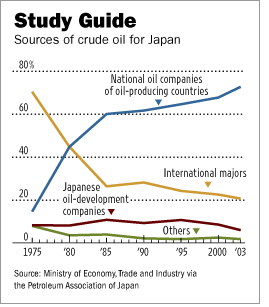China Studies Japan's Mistakes As the Pursuit for Oil Continues

By YUKA HAYASHI Staff Reporter of THE WALL STREET JOURNAL
August 3, 2005
TOKYO -- If the unraveling of Cnooc Ltd.'s bid for U.S. oil company Unocal Corp. shows the perils of China's aggressive oil strategy, the story of neighboring Japan offers a sobering counterlesson: What happens when you aren't aggressive enough.
Chinese oil developer Cnooc yesterday withdrew its bid for Unocal in the face of heavy political opposition in the U.S. Yet experts say energy-hungry China is likely to continue its aggressive pursuit of big oil assets world-wide.
One big reason: the experience of Japan, which in the 1960s and 1970s chose a very different, low-profile oil-procurement strategy -- and failed miserably.
Experts say China, which faces the kind of sharp rise in oil demand that Japan did when its economy was taking off, is studying Japan's mistakes -- as well as its successes -- and learning from them.
"I think the Chinese have learned a lot from us," says Tsutomu Toichi, head of research at Japan's Institute of Energy Economics. Mr. Toichi says Chinese oil officials have boasted to him that China has managed to acquire as much oil-production capacity overseas in several years as Japan did in 30.
Here are some lessons that experts say China has learned -- or is learning -- from Japan:
Concentrate Your Efforts
In Japan, almost every oil refiner and trading company set up its own oil-exploration firm, meaning that there were dozens of small players rather than a few large, wealthy developers. Most of those little companies were able to get into only small exploration projects, most of which resulted in dry wells.
Worse, because the Japanese government was picking up 70% of all oil-exploration costs, the developers didn't feel the need to spend efficiently. It wasn't until this year that Japan finally disbanded Japan National Oil Corp., the company that disbursed funds for exploration projects.
China, in contrast, has three, big, state-controlled oil companies, and is trying to turn Cnooc into a global competitor.
Buy, Don't Explore
Japanese oil-development companies spent too much on exploration, rather than acquiring oil reserves that already had been found -- not a smart move for a country with limited experience in the area, says Fereidun Fesharaki, senior fellow for energy-economics research at the East-West Center in Honolulu. Mr. Fesharaki estimates the Japanese government spent $50 billion for oil-exploration projects conducted by Japanese companies during the past three decades. Yet in 2003, only 5.7% of Japan's oil imports came from Japanese-owned fields.
In contrast, China has targeted proven reserves and working wells, as in its pursuit of Unocal. "For the amount of the money [Japan] spent, they could have bought several major oil companies," Mr. Fesharaki says.
Don't Forget Oman
After its failed quest to develop its own resources, Japan redoubled its diplomatic efforts to make sure it could get a stable flow of crude from a wide range of oil-producing countries. In particular, it looked for places where major Western companies had relatively weak influence or were prevented from going in. With generous use of financial and technological assistance, Japan built good relations with smaller oil producers such as Abu Dhabi, Qatar and Oman, while limiting its reliance on Saudi Arabia.
China also has learned the importance of diversifying oil supplies. Cnooc's investments are scattered around the world, from Sudan to Venezuela to Azerbaijan.
Keep a Stash in Reserve
Japan has been well prepared for fluctuations in oil supplies since an oil crunch in 1973 caused anxiety for much of Japanese industry. The country has reduced its reliance on oil, becoming more energy-efficient.
Today, Japan has a strategic oil reserve that amounts to nearly half of the country's annual oil needs. China doesn't yet have such a system, which Chinese officials have come to Japan to study several times in recent years, says Yoshihiro Sakamoto, a former top official of the Ministry of Economy, Trade and Industry. He is now president of Japan's Arabian Oil Co., which has exploited oil and gas deposits in the Middle East, the Gulf of Mexico, the South China Sea and the Norwegian North Sea.
Write to Yuka Hayashi at yuka.hayashi@wsj.com

0 Comments:
Post a Comment
Subscribe to Post Comments [Atom]
<< Home